How to become a Prompt Engineer: Full Guide

The rapid evolution of artificial intelligence (AI) has brought forth a new and exciting field: prompt engineering. As large language models (LLMs) become increasingly sophisticated, the ability to effectively communicate with them is paramount. This article provides a comprehensive overview of prompt engineering, covering what it is, why it's important, and how you can become a skilled prompt engineer.
Table of Contents
- What is a Prompt Engineer?
- The Importance of Prompt Engineering in AI Development
- Skills and Knowledge for Prompt Engineering
- Educational Backgrounds and Training Programs
- Career Paths and Job Opportunities
- The Future of Prompt Engineering
- Ethical Considerations and Challenges
- Key Takeaways
What is a Prompt Engineer?
A prompt engineer is a specialist who designs and refines the inputs, or "prompts," that guide AI models to generate desired outputs. These prompts can range from simple questions to complex code snippets, each meticulously crafted to elicit accurate, relevant, and meaningful responses from the AI.
Prompt engineers need a deep understanding of how AI models function, including their strengths and limitations. They serve as a crucial link between humans and AI, ensuring clear and effective communication. This involves not only choosing the right words but also understanding the underlying structure and logic of the AI model to optimize its performance.
The Importance of Prompt Engineering in AI Development
Prompt engineering is essential for making AI reliable in various applications. Here's how it plays a vital role:
- Improved Accuracy and Relevance: Well-crafted prompts guide AI models to generate more accurate and relevant responses by providing clear instructions and context.
- Enhanced User Experience: Intuitive prompts facilitate smoother interactions between users and AI, reducing frustration and confusion.
- Mitigating Bias and Misinformation: Prompt engineers help mitigate biases in AI models by framing questions in a neutral and objective manner.
- Increased Efficiency and Automation: Prompt engineering enables AI to handle routine tasks more efficiently, freeing up human resources for more strategic roles.
- Innovation in Research and Development: By helping researchers extract clearer insights from AI models, prompt engineering accelerates the research process.
- Automatic Prompt Optimization: Techniques like automatic prompt optimization, where algorithms refine prompts based on performance data, ensure continuous improvement in AI responses.
You can test, analyze, deploy, and manage prompts with your whole team. Get started here.
Skills and Knowledge for Prompt Engineering
Becoming a successful prompt engineer requires a diverse skillset that combines technical expertise, domain knowledge, and essential soft skills. This interdisciplinary field draws from linguistics, psychology, and computer science.
Here's a breakdown of the essential skills and knowledge:
Educational Backgrounds and Training Programs
While a dedicated degree in prompt engineering is not yet common, several educational backgrounds provide a strong foundation:
- Computer Science: Provides fundamental knowledge of programming, algorithms, and data structures.
- Linguistics: Offers insights into the nuances of language, crucial for crafting effective prompts.
- Cognitive Science: Provides a multidisciplinary perspective on human cognition, applicable to designing AI systems that interact effectively with humans.
- Data Science: Equips you with skills to analyze data, evaluate AI outputs, and optimize prompt design.
To specialize in prompt engineering, consider these training programs:
- Online Courses and Bootcamps: Platforms like Coursera, Udemy, and FutureSkills Academy offer focused programs on prompt engineering.
- Certifications: Organizations like Blockchain Council and DataCamp provide certifications in prompt engineering.
- Workshops and Conferences: Attending AI and prompt engineering workshops and conferences offers insights into the latest trends and best practices.
Career Paths and Job Opportunities
The field of prompt engineering is experiencing rapid growth, with increasing demand for skilled professionals across various industries.
Industries Hiring Prompt Engineers:
- Technology: Tech companies are at the forefront of AI development, actively seeking prompt engineers for LLMs, chatbots, and other AI applications.
- Healthcare: Prompt engineers contribute to AI systems for medical diagnosis, patient interaction, and drug discovery.
- Finance: They help develop AI systems for customer service, fraud detection, and automated trading in the finance industry.
- Education: Prompt engineers work on developing conversational AI tutors and virtual assistants for education.
- Marketing and Content Creation: They create AI-powered tools for generating marketing content, writing articles, and creating personalized advertising campaigns.
Common Job Titles:
- Prompt Engineer
- AI Prompt Engineer
- NLP Prompt Specialist
- AI Interaction Designer
- Conversational AI Designer
- LLM Interaction Engineer
Salary Expectations:
Salaries for prompt engineers vary based on experience, location, and industry. Entry-level positions typically start around $85,000 to $95,000 per year, while mid-level professionals can earn between $110,000 and $130,000. Senior prompt engineers with extensive experience can command salaries upwards of $175,000 annually, and Glassdoor reports an even higher average base salary of $178,114 per year. Freelancers often charge between $60 and $120 per hour.
The Future of Prompt Engineering
The future of prompt engineering is bright, with continued growth expected as AI becomes more sophisticated. The demand for skilled prompt engineers is projected to rise as organizations recognize the importance of effective human-AI interaction.
Key trends shaping the future of prompt engineering include:
- Adaptive Prompting: AI models may generate their own prompts based on context, reducing the need for manual prompt creation.
- Multimodal Prompts: The rise of multimodal AI models capable of processing text and images will expand the scope of prompt engineering.
- Ethical Prompting: There will be a growing emphasis on crafting prompts that ensure fairness, transparency, and bias mitigation.
- Impact on Various Industries: Prompt engineering will impact sectors like healthcare, customer service, marketing, and education, improving patient interactions, generating targeted content, and more.
- Growth of the Field: The increasing adoption of AI technologies will fuel the growth of the prompt engineering field, offering ample opportunities for specialization and advancement.
Ethical Considerations and Challenges
Prompt engineering presents ethical challenges that require careful consideration. Prompt engineers must ensure AI systems are developed and used responsibly.
Ethical Considerations:
- Bias Mitigation: Design prompts that mitigate biases inherited from training data, ensuring fair and unbiased outputs.
- Privacy Protection: Prioritize user data confidentiality and employ techniques like anonymization and encryption.
- Transparency and Explainability: Make AI systems more transparent and explainable, so users understand how the model makes decisions.
Challenges:
- Ambiguous Prompts: Crafting clear, concise, and unambiguous prompts can be challenging.
- Handling Long and Complex Prompts: Managing long and complex prompts requires careful structuring and organization.
- Interpreting and Debugging Model Responses: Understanding and debugging AI model responses can be challenging.
- Prompt Injection: This security vulnerability involves using malicious prompts to manipulate AI models. Prompt engineers must implement safeguards against such attacks.
Key Takeaways
Prompt engineering is a rapidly evolving field with a promising future. Here are some key takeaways for aspiring prompt engineers:
- Develop a Diverse Skillset: Focus on programming, AI/ML principles, NLP, and data analysis.
- Embrace Continuous Learning: Stay updated on the latest advancements in AI, new prompt engineering techniques, and ethical considerations.
- Consider Specialized Training: Explore online courses, bootcamps, and certifications to gain specialized knowledge.
- Explore Career Opportunities: Research different career paths and identify industries that align with your interests.
- Be Mindful of Ethical Considerations: Strive to develop AI systems that are fair, unbiased, and responsible.
By embracing these principles, prompt engineers can play a vital role in shaping a future where AI and humans collaborate effectively and ethically.
About PromptLayer
PromptLayer is a prompt management system that helps you iterate on prompts faster — further speeding up the development cycle! Use their prompt CMS to update a prompt, run evaluations, and deploy it to production in minutes. Check them out here. 🍰



